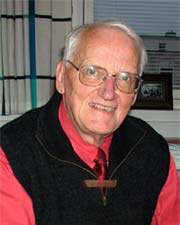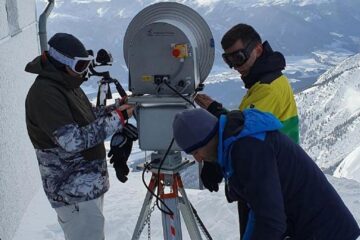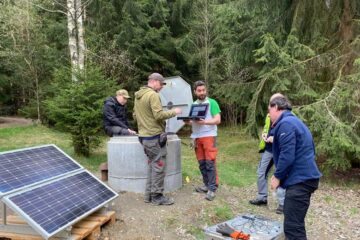Two Ecologists Receive 2004 Stockholm Water Prize for Outstanding Contributions for the World’s Lakes and Wetlands

Professor Sven Erik Jørgensen
The 2004 Stockholm Water Prize has been awarded to Professors Sven Erik Jørgensen, Denmark, and William J. Mitsch, USA. Through their pre-eminent contributions to the knowledge of how lakes and wetlands function, Professors Jørgensen and Mitsch have contributed substantially to understanding how to make human use of them more sustainable and how to protect them better in the future.
In its motivation, the Nominating Committee wrote: The Professors Sven-Erik Jørgensen and William J. Mitsch are awarded the Stockholm Water Prize 2004 for their pioneering development and global dissemination of ecological models of lakes and wetlands, widely applied as effective tools in sustainable water resource management.
Professor Jørgensen, 69, is a professor of environmental chemistry at the Danish University of Pharmaceutical Sciences in Copenhagen. Professor Mitsch, 56, is a professor of natural resources and environmental science and director of the Olentangy River Wetland Research Park at The Ohio State University in Columbus. Their theoretical and applied work on lake and wetland ecosystems, management of lake and wetland water quality, and lake, river and wetland conservation, restoration and usage has been acknowledged and implemented in both developing and developed countries.
The scientific fields of the Laureates complement one another and they will share the 2004 Stockholm Water Prize. His Majesty King Carl XVI Gustaf of Sweden will present the Prize in the Stockholm City Hall on Thursday, August 19, 2004. The Laureates will also share the USD 150,000 Prize sum.
Lakes and wetlands – precious resources
Lakes and wetlands have inestimable value and are important and often easily available water resources. Lakes supply drinking water, hydropower, food, irrigation and recreation, yet they are threatened by pollution and excessive water withdrawal. Wetlands are cradles of vital biological diversity and provide the water and primary productivity upon which numerous species of plants and animals depend for survival. But they are threatened by drainage for use in agriculture and other purposes. Preservation of lakes and wetlands is a life necessity for people in many regions of the world, given their cultural, ecological and socio-economic value.
Creating sustainability by understanding how lakes and wetlands work
Sustainability as a concept is fine on paper, but until it is broken down into activities managed through appropriate tools, it remains only a concept. Professor Jørgensen’s unique ecosystem models encompass entire lake and wetlands systems and the physical, biological and chemical interactions taking place within them. These kinds of system models provide managers and planners with concrete tools to address problems and implement solutions.
As an example, he and his co-workers developed modelling software for the United Nations Environment Programme to support planning and decision making for the management of lakes and wetlands in developing countries and countries in transition. Today, more and more freshwater bodies have become polluted by nutrients originating from agricultural, domestic and industrial sources, a situation which causes them to become eutrophic (where excessive algal growth results in severe changes of water quality and the ecology). The software developed by Professor Jørgensen provides an easy-to-use tool that allows for a better understanding of eutrophication processes, including its origins and effects, as well as preventive and remedial measures. Another UN agency – the United Nations Educational, Scientific and Cultural Organisation (UNESCO) – has selected Professor Jørgensen’s publications on lake research and management as guideline books for lake environmental management.
Professor Mitsch was the inspiration behind the Olentangy River Wetland Research Park at The Ohio State University, a world-class wetland research and education facility. There, among other focus areas, research on the ecological restoration of the Mississippi-Ohio-Missouri Basin is being spearheaded. To help reduce coastal pollution in the northern Gulf of Mexico, the ultimate depository of the Mississippi, he has also taken the role as leader in the debates, studies and resolutions dealing with coastal wetland losses in the US state of Louisiana. He has also shown that constructed wetlands can be engineered for use as buffering and purification systems, as has Professor Jørgensen, who for the last nine years has been responsible for a project in Tanzania to develop better knowledge of such systems. In practical terms, artificial wetlands can be ideal for use as an inexpensive, final stage in the domestic wastewater treatment process – an approach which could have significant meaning for the developing world.
Promoters of ecological approaches
Professors Jørgensen and Mitsch have collaborated often. The ecosystem approach advocated by them is a strategy for the integrated management of living resources on land and in the water that promotes sustainable use in an equitable way. Through both theoretical developments and practical applications of ecological engineering – by their definition, „the design of sustainable ecosystems that integrate human society with its natural environment for the benefit of both“ – they have integrated various existing environmental fields such as classical ecology, agro-ecology and restoration ecology. The skills of these fields are used to design low-impact systems for waste treatment, food and energy production, habitat restoration and other benefits.
Influencing future leaders in the field
As educators, authors and speakers, Jørgensen and Mitsch have directly or indirectly influenced and inspired many of the scientists and environmental engineers responsible for lake and wetland protection in all parts of the world. Professor Jørgensen has led many courses in developing countries and advises agencies and authorities also on the use and protection of wetlands.
An international SCOPE (Scientific Committee on Problems in the Environment) on ecological engineering and ecosystem restoration initiated by and chaired by Professor Mitsch held workshops in Tallin, Estonia, and Beijing, China, to investigate applications of ecological engineering in developing countries and countries in transition. Such approaches have also been applied in several sub-Saharan countries in Africa, parts of Asia and elsewhere. Many results have been published in the leading publication in the field, “Ecological Engineering,” which Professor Mitsch founded. Professor Mitsch co-authored the university standard textbook “Wetlands,” which today influences future water professionals around the world.
The Laureates have also always emphasised the importance of assisting countries and regions which have differing states of technical and scientific development than the Western nations.
The Stockholm Water Prize
The Stockholm Water Prize was established in 1990 by the Stockholm Water Foundation and is presented annually in honour of outstanding achievements in water science, management, action or awareness building. It can be awarded to the man, woman, institution, organisation or company whose applied research or direct action increases knowledge of the water environment. Prize Laureates have represented many water-related disciplines – including academia, education and research, development aid and charity, engineering, law – and have come from Australia, Canada, Denmark, Germany Great Britain, India, Israel, Japan, South Africa, Switzerland, the United States and Venezuela.
Founders of the Stockholm Water Prize are Anglian Water, Bacardi, DuPont, Fujitsu Siemens Computers, General Motors, Grundfos Management, Hewlett Packard, ITT Flygt, Kaupthing Bank Sverige, Kemira Kemwater, KPMG, Ragn-Sells, Scandinavian Airlines (SAS), Snecma, Stockholm Water Festival, Swedish Railways (SJ), Uponor Group and Water Environment Federation (WEF) in collaboration with the City of Stockholm.
Media Contact
Weitere Informationen:
http://www.siwi.orgAlle Nachrichten aus der Kategorie: Förderungen Preise
Neueste Beiträge

Erstmals 6G-Mobilfunk in Alpen getestet
Forschende der Universität Stuttgart erzielen leistungsstärkste Verbindung. Notrufe selbst in entlegenen Gegenden absetzen und dabei hohe Datenmengen in Echtzeit übertragen? Das soll möglich werden mit der sechsten Mobilfunkgeneration – kurz…

Neues Sensornetzwerk registriert ungewöhnliches Schwarmbeben im Vogtland
Das soeben fertig installierte Überwachungsnetz aus seismischen Sensoren in Bohrlöchern zeichnete Tausende Erdbebensignale auf – ein einzigartiger Datensatz zur Erforschung der Ursache von Schwarmbeben. Seit dem 20. März registriert ein…

Bestandsmanagement optimieren
Crateflow ermöglicht präzise KI-basierte Nachfrageprognosen. Eine zentrale Herausforderung für Unternehmen liegt darin, Über- und Unterbestände zu kontrollieren und Lieferketten störungsresistent zu gestalten. Dabei helfen Nachfrage-Prognosen, die Faktoren wie Lagerbestände, Bestellmengen,…





















